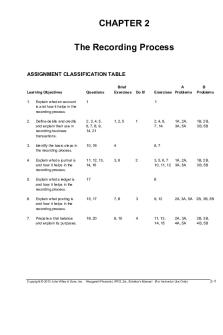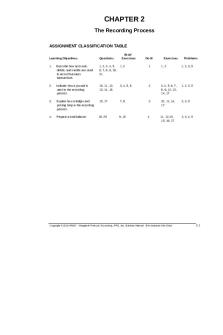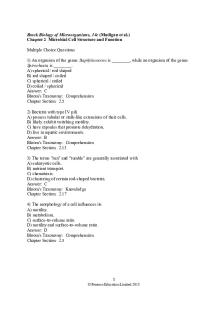ER8e SM Ch02 - Practice PDF

| Title | ER8e SM Ch02 - Practice |
|---|---|
| Author | Rikki Wa |
| Course | International Business Finance |
| Institution | Miami University |
| Pages | 6 |
| File Size | 120 KB |
| File Type | |
| Total Downloads | 50 |
| Total Views | 152 |
Summary
Practice...
Description
CHAPTER 2 INTERNATIONAL MONETARY SYSTEM ANSWERS & SOLUTIONS TO END-OF-CHAPTER QUESTIONS AND PROBLEMS
QUESTIONS
1. Explain Gresham’s Law.
Answer: Gresham’s law refers to the phenomenon that bad (abundant) money drives good (scarce) money out of circulation. This kind of phenomenon was often observed under the bimetallic standard under which both gold and silver were used as means of payments, with the exchange rate between the two fixed.
2.
Explain the mechanism which restores the balance of payments equilibrium when it is
disturbed under the gold standard.
Answer: The adjustment mechanism under the gold standard is referred to as the price-specieflow mechanism expounded by David Hume. Under the gold standard, a balance of payment disequilibrium will be corrected by a counter-flow of gold. Suppose that the U.S. imports more from the U.K. than it exports to the latter. Under the classical gold standard, gold, which is the only means of international payments, will flow from the U.S. to the U.K. As a result, the U.S. (U.K.) will experience a decrease (increase) in money supply. This means that the price level will tend to fall in the U.S. and rise in the U.K. Consequently, the U.S. products become more competitive in the export market, while U.K. products become less competitive. This change will improve U.S. balance of payments and at the same time hurt the U.K. balance of payments, eventually eliminating the initial BOP disequilibrium.
3. Suppose that the pound is pegged to gold at 6 pounds per ounce, whereas the franc is pegged to gold at 12 francs per ounce. This, of course, implies that the equilibrium exchange rate should be two francs per pound. If the current market exchange rate is 2.2 francs per pound, how would you take advantage of this situation? What would be the effect of shipping costs?
Copyright © 2018 McGraw-Hill Education. All rights reserved. No reproduction or distribution without the prior written consent of McGraw-Hill Education.
Answer: Suppose that you need to buy 6 pounds using French francs. If you buy 6 pounds directly in the foreign exchange market, it will cost you 13.2 francs. Alternatively, you can first buy an ounce of gold for 12 francs in France and then ship it to England and sell it for 6 pounds. In this case, it only costs you 12 francs to buy 6 pounds. It is thus beneficial to ship gold due to the overpricing of the pound. Of course, you can make an arbitrage profit by selling 6 pounds for 13.2 francs in the foreign exchange market. The arbitrage profit will be 1.2 francs. So far, we assumed that shipping costs do not exist. If it costs more than 1.2 francs to ship an ounce of gold, there will be no arbitrage profit.
4. Discuss the advantages and disadvantages of the gold standard.
Answer: The advantages of the gold standard include: (I) since the supply of gold is restricted, countries cannot have high inflation; (2) any BOP disequilibrium can be corrected automatically through cross-border flows of gold. On the other hand, the main disadvantages of the gold standard are: (I) the world economy can be subject to deflationary pressure due to restricted supply of gold; (ii) the gold standard itself has no mechanism to enforce the rules of the game, and, as a result, countries may pursue economic policies (like de-monetization of gold) that are incompatible with the gold standard.
5. What were the main objectives of the Bretton Woods system?
Answer: The main objectives of the Bretton Woods system are to achieve exchange rate stability and promote international trade and development.
6. Comment on the proposition that the Bretton Woods system was programmed to an eventual demise.
Answer: The answer to this question is related to the Triffin paradox. Under the gold-exchange system, the reserve-currency country should run BOP deficits to supply reserves to the world economy, but if the deficits are large and persistent, they can lead to a crisis of confidence in the reserve currency itself, eventually causing the downfall of the system.
Copyright © 2018 McGraw-Hill Education. All rights reserved. No reproduction or distribution without the prior written consent of McGraw-Hill Education.
7. Explain how special drawing rights (SDR) are constructed. Also, discuss the circumstances under which the SDR was created.
Answer: SDR was created by the IMF in 1970 as a new reserve asset, partially to alleviate the pressure on the U.S. dollar as the key reserve currency. The SDR is a basket currency currently comprised of five major currencies, i.e., the U.S. dollar, euro, Chinese yuan, Japanese yen, and British pound. Currently, the dollar receives a 41.73% weight, euro 30.93%, yuan 10.92, yen 8.33%, and pound 8.09%. The weights for different currencies tend to change over time, reflecting the relative importance of each currency in international trade and finance.
8. Explain the arrangements and workings of the European Monetary System (EMS).
Answer:
EMS was launched in 1979 in order to (i) establish a zone of monetary stability in
Europe, (ii) coordinate exchange rate policies against the non-EMS currencies, and (iii) pave the way for the eventual European monetary union. The main instruments of EMS are the European Currency Unit (ECU) and the Exchange Rate Mechanism (ERM). Like SDR, the ECU is a basket currency constructed as a weighted average of currencies of EU member countries. The ECU works as the accounting unit of EMS and plays an important role in the workings of the ERM. The ERM is the procedure by which EMS member countries manage their exchange rates. The ERM is based on a parity grid system, with parity grids first computed by defining the par values of EMS currencies in terms of the ECU. If a country’s ECU market exchange rate diverges from the central rate by as much as the maximum allowable deviation, the country has to adjust its policies to maintain its par values relative to other currencies. EMS achieved a complete monetary union in 1999 when the common European currency, the euro, was adopted.
9. There are arguments for and against the alternative exchange rate regimes. a. List the advantages of the flexible exchange rate regime. b. Criticize the flexible exchange rate regime from the viewpoint of the proponents of the fixed exchange rate regime. c. Rebut the above criticism from the viewpoint of the proponents of the flexible exchange rate regime.
Copyright © 2018 McGraw-Hill Education. All rights reserved. No reproduction or distribution without the prior written consent of McGraw-Hill Education.
Answer:
a. The advantages of the flexible exchange rate system include: (I) automatic
achievement of balance of payments equilibrium and (ii) maintenance of national policy autonomy. b. If exchange rates are fluctuating randomly, that may discourage international trade and encourage market segmentation. This, in turn, may lead to suboptimal allocation of resources. c. Economic agents can hedge exchange risk by means of forward contracts and other techniques. They don’t have to bear it if they choose not to. In addition, under a fixed exchange rate regime, governments often restrict international trade in order to maintain the exchange rate. This is a self-defeating measure. What’s good about having the fixed exchange rate if international trade need to be restricted?
10.
In an integrated world financial market, a financial crisis in a country can be quickly
transmitted to other countries, causing a global crisis. What kind of measures would you propose to prevent the recurrence of an Asia-type crisis.
Answer: First, there should be a multinational safety net to safeguard the world financial system from the Asia-type crisis. Second, international institutions like IMF and the World Bank should monitor problematic countries more closely and provide timely advice to those countries. Countries should be required to fully disclose economic and financial information so that devaluation surprises can be prevented. Third, countries should depend more on domestic savings and long-term foreign investments, rather than short-term portfolio capital. There can be other suggestions.
11. Discuss the criteria for a ‘good’ international monetary system.
Answer: A good international monetary system should provide (i) sufficient liquidity to the world economy, (ii) smooth adjustments to BOP disequilibrium as it arises, and (iii) safeguard against the crisis of confidence in the system.
12. Once capital markets are integrated, it is difficult for a country to maintain a fixed exchange rate. Explain why this may be so.
Answer: Once capital markets are integrated internationally, vast amounts of money may flow in and out of a country in a short time period. This will make it very difficult for the country to
Copyright © 2018 McGraw-Hill Education. All rights reserved. No reproduction or distribution without the prior written consent of McGraw-Hill Education.
maintain a fixed exchange rate.
13. Assess the possibility for the euro to become another global currency rivaling the U.S. dollar. If the euro really becomes a global currency, what impact will it have on the U.S. dollar and the world economy?
Answer: In light of the large transactions domain of the euro, which is comparable to that of the U.S. dollar, and the mandate for the European Central Bank (ECB) to guarantee the monetary stability in Europe, the euro may potentially become another global currency over time. A major uncertainty about this prospect is the lack of political (and fiscal) integration of Europe. If Europe becomes politically more integrated, the euro is more likely to become a global currency. If the euro becomes a global currency, it will come at the expense of the dollar. Currently, the U.S. derives substantial benefits from the dollar’s status as the dominant global currency – for instance, the U.S. can run trade deficits without having to maintain substantial foreign exchange reserves, can carry out international commercial and financial transactions in dollars without bearing exchange risk, etc. If the euro is to be used as a major denomination, reserve, and invoice currency in the world economy, dollar-based agents will start to bear more exchange risk, among other things.
MINI CASE: Grexit or Not? When the euro was introduced in 1999, Greece was conspicuously absent from the list of the European Union member countries adopting the common currency. The country was not ready. In a few short years, however, European leaders, probably motivated by their political agenda, allowed Greece to join the euro club in 2001 although it was not entirely clear if the country satisfied the entry conditions. In any case, joining the euro club allowed the Greek government, households, and firms to gain easy access to plentiful funds at historically low interest rates, ushering in a period of robust credit growth. For a while, Greeks enjoyed what seemed to be the fruits of becoming a fullfledged member of Europe. In December 2009, however, the new Greek government revealed that the government budget deficit would be 12.7% for 2009, not 3.7% as previously announced by the outgoing government, far exceeding the EU’s convergence guideline of keeping the budget deficit below 3.0% of the GDP. As the true picture of the government finance became known, the prices of Greek government bonds began to fall sharply, prompting panic selling among international investors, threatening the sovereign defaults. Several years into the crisis, the Greek government debt stands at around 180% of GDP and the jobless rate among youth is above 50%. The country’s GDP declined by about
Copyright © 2018 McGraw-Hill Education. All rights reserved. No reproduction or distribution without the prior written consent of McGraw-Hill Education.
25%. Severe austerity measures, such as sharply raised taxes and much reduced pension benefits, were imposed on Greece as conditions for the bailouts arranged by the EU, IMF, and the European Central Bank. In addition, people were allowed to have only restricted access to their bank deposits, to prevent bank runs. Opinion polls indicate that the majority of people in Germany, the main creditor nation for Greece, prefer the Greek exit from the euro-zone, popularly called Grexit, while some people in Greece are demanding Grexit themselves and restoration of the national currency, the drachma. Discussion points: (i) the root causes of the Greek predicaments; (ii) the costs and benefits of staying in the euro-zone for Greece, (iii) the measures that need to be taken to keep Greece in the euro-zone in the long run if that is desirable, (iv) If you were a disinterested outside advisor for the Greek government, would you advise Grexit or not? Why or why not ? Suggested Solution to Grexit or Not? As is often the case with many sovereign debt crises in history, the Greek sovereign debt crisis, which raises the possibility of Grexit from the euro-zone, is attributable to the excessive borrowing and spending on the part of the government which cannot be adequately financed by the government revenues. As is well known, tax evasion is widely spread in Greece while pension benefits and other welfare services are lavish compared with the country’s economic resources. And the lack of transparency of the government finance also contributed to the steep decline in the Greek government bond prices in late 2009 and 2010. Greece is still not out of crisis in part because the country now doesn’t have its own monetary policy that can be tailored to address its dire economic conditions, like easy monetary policy and depreciation of the national currency to help the country recover from the crisis quickly. The lack of policy independence thus is a very major cost of remaining in the euro-zone. If Greece is to remain in the euro-zone, it has to reduce the government expenditures, cut business costs, and boost labor productivity, among other things. If it is difficult to implement the above and other measures to strengthen the competitiveness of the Greek economy, the country then may seriously consider getting out of the euro-zone and recovering national policy autonomy with its own currency.
Copyright © 2018 McGraw-Hill Education. All rights reserved. No reproduction or distribution without the prior written consent of McGraw-Hill Education....
Similar Free PDFs

ER8e SM Ch02 - Practice
- 6 Pages

SM CH02 - solution manuals CH7
- 87 Pages

ER7e SM Ch02 - inter finance
- 6 Pages

Libby 10e Ch02 SM - solution manual
- 62 Pages

Ch02
- 66 Pages

Ch02
- 60 Pages

Ch02
- 18 Pages

Ch02 PPT
- 71 Pages

Ch02 Analyzing Transactions
- 64 Pages

HW Week2 Solution ch02
- 6 Pages

Ch02 Problem Solutions
- 20 Pages
Popular Institutions
- Tinajero National High School - Annex
- Politeknik Caltex Riau
- Yokohama City University
- SGT University
- University of Al-Qadisiyah
- Divine Word College of Vigan
- Techniek College Rotterdam
- Universidade de Santiago
- Universiti Teknologi MARA Cawangan Johor Kampus Pasir Gudang
- Poltekkes Kemenkes Yogyakarta
- Baguio City National High School
- Colegio san marcos
- preparatoria uno
- Centro de Bachillerato Tecnológico Industrial y de Servicios No. 107
- Dalian Maritime University
- Quang Trung Secondary School
- Colegio Tecnológico en Informática
- Corporación Regional de Educación Superior
- Grupo CEDVA
- Dar Al Uloom University
- Centro de Estudios Preuniversitarios de la Universidad Nacional de Ingeniería
- 上智大学
- Aakash International School, Nuna Majara
- San Felipe Neri Catholic School
- Kang Chiao International School - New Taipei City
- Misamis Occidental National High School
- Institución Educativa Escuela Normal Juan Ladrilleros
- Kolehiyo ng Pantukan
- Batanes State College
- Instituto Continental
- Sekolah Menengah Kejuruan Kesehatan Kaltara (Tarakan)
- Colegio de La Inmaculada Concepcion - Cebu




